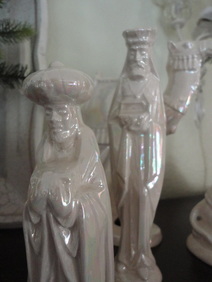resources for your journey with jesus |
READ: Matthew 2:1-2, 9-11, Malachi 1:11-12, Psalm 141:2, Revelation 5:8, John 19:38-40 (click on verses to read) My love language is gifts, which according to author Gary Smalley, means that while some people need encouraging words, or acts of service, and others need quality time, or physical touch to feel loved, all I need you to do is give me a present. (When you add that to the fact that it has to be a surprise, you can see the kind of pressure my poor husband lives under!) This probably explains why my favorite part of the Christmas story is when the magi from the east brought gold, frankincense and myrrh to the Christ child, an act that spawned the centuries-old tradition of giving gifts in celebration of His birth. As it turns out, the fact that they brought gifts might be the only detail we get right when we include those wise men in our plays or carols or crèches. Even a cursory read of Matthew’s account of their journey reveals that they were never at the manger, and had to have arrived much later. (I think of that every year when I set out my mother of pearl nativity set, and solve the problem by setting them slightly apart just to prove that I am not Biblically illiterate.) There are however, a few other fallacies about the magi that seem to have become embedded in the Christmas story. For example, the Bible never calls the wise men kings, nor does it tell us where they came from (other than the east), or that they arrived on camels. In fact, nothing indicates that they actually followed a star, although they definitely saw one before they started on their journey, and were filled with great joy when they saw it again as they approached Bethlehem. Though Scripture mentions three gifts, it doesn’t tell us that there were only three magi – there could have been a dozen of them. All of this then begs the question, how did we end up with these notions about the wise men’s role in the drama of Christ’s birth? An in-depth internet search on the subject sent my head spinning. What I discovered is that scholars differ on the source of every one of these things, although many assert their opinions with a great deal of authority. After a frustrating few hours of trying to assimilate the plethora of information out there, I threw up my hands and asked for wisdom from above. When things didn’t get any clearer, it occurred to me that perhaps God never intended for us to ferret out the intricate details of these men’s role in the story, that all along He has left us in the dark for good reason. Why? For one thing, because He is a God of wonder and mystery, and loves to watch us wrestle with His Word and wanting to know more. But beyond that, the sparsity of details regarding the magi may be meant to point us to the one thing that is beyond dispute, which is that these men from the east brought gifts to the Christ child. Why? Perhaps God wanted us to know how much he delights in giving, indeed that the inclination to bless others is at the very heart of His character. This is an awesome truth. But then, what about the actual gifts? Is there some spiritual symbolism in the gold, frankincense and myrrh? Well, if you like your packages neatly wrapped (no pun intended); even this might be a bit disappointing. Once again, scholars offer a host of ideas about these things, loosly tying them to various Scriptures. While many of these are fascinating to consider, in the end, they are all still, simply ideas. So as we wrap our gifts and tie our bows and enter into the joy of giving this week, let us think about the mystery of those men who traveled far from home, bearing treasures fit for a King. With each present we share – to those we love or to strangers in need – let us remember that giving has always been God’s idea, that He does indeed love to give good and perfect gifts to all of His children. And in the rush of final preparations for Christmas, may we each find at least one quiet moment to kneel before our King as the magi did so long ago, and offer Him that which will bring Him the greatest pleasure – the one thing no one else can give – the love we each have for Him in our hearts. REFLECTWhile Scripture is not definitive on the symbolism of the gifts the magi brought, it makes a great study, and there are meaningful insights to glean. I have included a few references in the Scripture readings for today. Go back and read them again (click here). Spend some time pondering these three things, asking God to speak to you personally about their meaning for your life today. Ask Him these two questions about each of them: Lord, is there a truth about yourself that You want to captivate my heart with today in regards to this? Lord, is there something about my own life You want to reveal in regards to this? RESPONDTake a few minutes right now to physically kneel before the Lord, imagining what it must have felt like for the magi when they met the Messiah. See yourself giving Jesus the only gift no one else can--the affections of your heart. Know that this gives Him great joy. Rest in the wonder of this. A CHRISTMAS ACTIVITYIt’s time to get creative! Consider the three gifts of the magi and try to come up with a way to tell the Gospel story, using these. You could do so through teaching, or even coming up with a fictional story about the three gifts. Share what you come up with over dinner with your family or some friends.
0 Comments
Leave a Reply. |
Tricia McCary RhodesAuthor of 7 books and pastor of Global Leadership Development at All Peoples Church in San Diego, Tricia specializes in helping others experience God’s presence through practicing soul-care. Archives
February 2024
|



 RSS Feed
RSS Feed